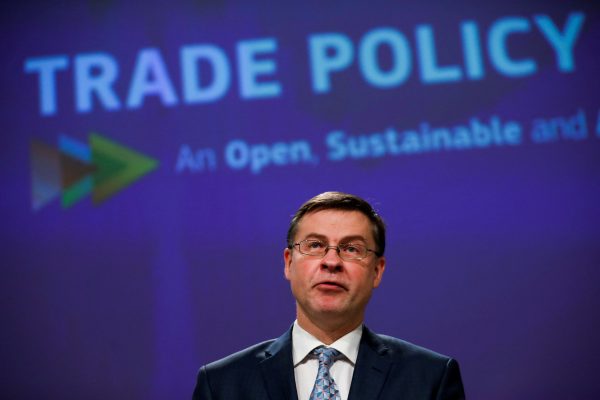These policies create uncertainty, increase investment risk premiums and distort trade. World Trade Organization (WTO) members can justify unilateral action to achieve non-economic objectives by invoking general or essential WTO security exceptions. But widespread recourse to these provisions constitutes a major threat to the rules-based trade order. For the rules to function there must be general acceptance of norms of good behaviour. Those norms are violated when public morals or economic security become a cover for unilateral discriminatory trade policies.
What possible paths forward are there on multilateral trade cooperation?
The erosion of trust among the large economic powers, reflected in their increased willingness to ‘weaponise’ trade policy, is a major constraint to launching negotiations on new rules of the trade game. Instead, strategic autonomy, economic security and other non-economic objectives motivate calls for collaboration among countries with similar values and political-economic systems.
For the WTO to remain relevant in the 21st century, members have to recognise that international trade increasingly is linked to systems competition, cooperation and contestation over non-economic objectives — for which trade is seen as instrumental to policy success. The use of dispute settlement procedures, especially in cases where essential security interests are invoked, is likely to be both counterproductive and ineffective.
Efforts to safeguard an open global trade regime should instead centre on processes through which WTO members engage in policy dialogue. Institutionally supported frameworks must enable peer-based deliberation to assess the effectiveness and efficiency of the unilateral pursuit of non-economic objectives and their associated spillovers, which may be positive or negative. Such dialogue is necessary to inform the multilateral cooperation needed to address the major threats and collective action problems confronting the global community.
Systemic differences and geopolitical rivalry need not preclude cooperation to lessen or manage policy spillovers. The administration of US President Biden has made it clear that the United States is not interested in negotiating traditional preferential trade areas that centre on the reciprocal reduction of tariffs and non-tariff barriers on substantial volumes of trade. Instead, the United States is pursuing issue-specific cooperation and frameworks to coordinate policies, such as agreeing on regulatory practices on digital trade and the governance of supply chains.
One US initiative is the Indo-Pacific Economic Framework for Prosperity, which promotes trade liberalisation, open digital trade and free cross-border data flows with Asia. Such arrangements have implications for the trading system insofar as they act as frameworks for cooperation among subsets of WTO members. These subsets jointly condition trade and investment on shared values, including through production requirements relating to labour, human rights and environmental sustainability.
If associated regulatory cooperation arrangements are open to any economy interested in participating, with benefits extended conditionally after implementing agreed regulatory standards or principles, they can support a process of gradual multilateralisation. If, instead, regulatory cooperation is designed to be made up of exclusive arrangements, it could fragment the global trade system. Domain-specific open plurilateral agreements offer a better prospect for multilateralisation than preferential trade agreements.
Cooperation must be rooted in an understanding of the objectives of the participants and the way their interests are related to the domestic and international commitments of the countries involved. WTO reforms are not needed for discussions among members on non-economic objectives, but there must be political willingness to go beyond the ‘bread-and-butter’ of the WTO — it must negotiate on trade policy without considering the rationale for using specific trade instruments.
WTO members that condition access to their market on satisfying specific production requirements to achieve a non-economic objective have an interest in other states doing so as well. In many cases, WTO members may share a non-economic objective, providing scope for dialogue and discussion about possible joint action. Cooperation can take the form of concerted action by like-minded economies, but it is better to put in place a framework that encourages the formation of WTO-sanctioned clubs. This would ensure greater scrutiny, transparency, and analysis of the effects of trade–non-economic objective issue linkages that are pursued by groups of countries. This would benefit the jurisdictions pursuing joint action by helping them to monitor implementation and understand if interventions are effective and efficient. It will benefit those that do not join a club by providing an institutional mechanism that generates information on the benefits of club participation, the extent and incidence of the external effects of a club, and a channel through which to engage with club members.
There is much to be gained from cooperating on non-economic objectives of broadly common interest. Alliances have long been a form of international cooperation and are likely to appear more in the future to support deeper integration among like-minded economies. WTO reform discussions should include a focus on developing a multilateral framework to guide the formation of groups of like-minded economies motivated by non-economic objectives.
Facilitating scrutiny of such initiatives by WTO members would help club participants design and implement policies that are efficient. Accommodating clubs would also benefit non-participants by reducing the potential adverse effects on the trading system by establishing principles that clubs should abide by, including being open to any member willing to participate.
Anchoring clubs in the WTO would provide them with a multilateral institutional basis, foster transparency and support informed peer review of the use of trade policy instruments justified by non-economic objectives.
Bernard Hoekman is Professor and Director of Global Economics at the Robert Schuman Centre for Advanced Studies in the European University Institute, and a research fellow at the Centre for Economic Policy Research.
Petros C Mavroidis is Professor of Law at Columbia Law School.
Douglas Nelson is Professor in the Department of Economics at Tulane University and External Fellow at the University of Nottingham.

